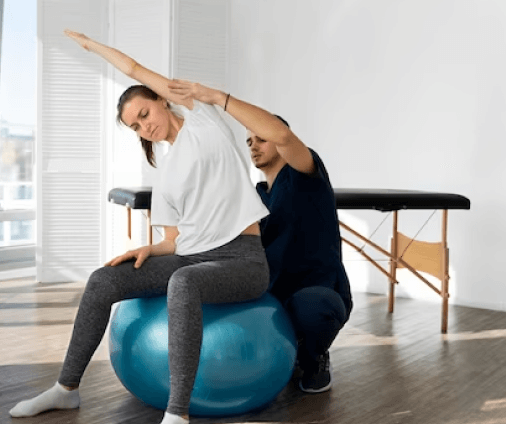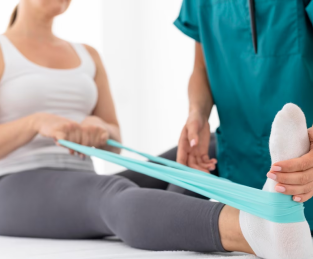
Enhancing Health, Elevating Lives
Behind the Scenes at CK Physiotherapy
CK Physiotherapy has been serving the community since 2003, stemming from a determination to improve lives. Learn our story, meet the team, and discover how we can shape a healthier, agile you.

Unveiling our Mission
Why CK Physiotherapy?
We believe physiotherapy is more than just treatment - it's about empowering individuals to lead active, fulfilling lives. Our dedication to wellness is fueled by this firm belief, shaping our commitment to improving our patients' health and well-being through personalised services.



From Humble Beginnings
The CK Physiotherapy Journey
Bryan Kelly started CK Physiotherapy in 2003 at Gold’s Gym in Hanwell. Responding to the community's growing needs, in 2008, we moved to our current location on Elthorne Avenue. Today, our two dedicated treatment rooms hum with the steady work of professionals, singularly focused on enhancing patient well-being.

The CK Physiotherapy Solution
Tackling Your Pain Points Head-On
Meet the Heroes Behind Your Health Journey
Our Dedicated Physiotherapists
Here are our physiotherapists who drive our services. Members of the Chartered Society of Physiotherapy and registered with the Health Professions Council drive, we’re committed to continuous learning and constantly upgrading our clinical skills through post-graduate education.

Bryan Kelly
Physiotherapist
Bryan graduated from physiotherapy at Curtin University in Perth Western Australia in 1995, moving to the UK in 1997 where he worked in the NHS and private practice.
He has enjoyed working with several sporting teams including Australian Rules Football, rugby, hockey, netball and basketball, He has also worked with a prominent ballet school and dance company in London.
Bryan has a strong passion for promoting recovery from a wide range of musculoskeletal conditions. Special interests include the treatment of back and neck pain, sporting injuries and postural problems. He integrates an evidence-based active approach along side a variety of skills including manual therapy (joint mobilisation, manipulation and soft tissue massage), muscle balance techniques, exercises programmes and acupuncture.
When not working Bryan can often be found walking the dog around the park, along the Grand Union canal or in the Lake District as he tries to complete all the Wainwright Fells.
Bryan is currently available Mon- Friday, including some evenings

Angela Benjamin
Physiotherapist
Angela is passionate about making changes in peoples' lives and finding long-term solutions to their problems. Having graduated from St Mary's Hospital, in London in 1992, she then worked in the NHS for several years, where she developed an interest in musculoskeletal conditions. Angela then completed her Master's degree in Sports Medicine at Glasgow University.
Since then Angela has worked in the private sector and has gained experience working with professional athletes, has comprehensive experience as a manual therapist, and uses acupuncture as an integral part of her practice.
When not working as a physiotherapist, Angela uses her hands a different way and can be found in her 'She Cave' crafting bespoke jewellery. You can view her work at https://www.angebdesigns.com
Angela is currently available Monday mornings, Thursday afternoon and evening and Saturday mornings
You Ask, We Answer
Frequently Asked Questions
Your questions, our expert answers. Dive into our selection of the most commonly asked questions about our services and physiotherapy in general.
What should I expect from a physiotherapy session?
Your physiotherapist will begin with a full assessment and physical examination to establish the cause and nature of your condition.
After this, the physiotherapist will look at the results and consider your past medical history to determine, in conjunction with your wishes, what treatment is most fitting for your needs and create a personalised treatment plan.
Here at CK Physiotherapy we use different treatment methods in order to deal with a wide range of injuries. We pride ourselves on using ‘hands on’ treatment and you will not just be given a sheet of exercises.
Depending on the nature and severity of your injury, you may require:
- Manipulation or mobilisation of joints
- Soft tissue massage
- Electrotherapy (Laser, Ultrasound, Interferential, Short Wave Diathermy)
- Shockwave therapy
- Acupuncture
- Exercise therapy (Stretching and strengthening,Core stability training)
- Heat or cold therapy
- Patient education, home exercises
- Biomechanical analysis
Do I need a referral to attend?
No, you can self-refer for physiotherapy if you feel you have a problem we can help with. If your GP or Consultant has requested physiotherapy we would be happy to provide that service for you; please bring a copy of the referral if you have one.
If you use private medical insurance, you may need a GP’s referral, depending on your insurer’s requirements. You should always check with your insurance company before attending your first session.
How many physiotherapy sessions will I need?
Physiotherapy is not an exact science, as people respond differently, but once you have had your assessment, your Physiotherapist will be able to give you a rough guide to the number of treatments you will need and We will discuss your goals and a treatment plan with you.
What should I wear to my appointment?
Attending a Physiotherapy appointment for the first time can be apprehensive. People often wonder what they should wear.
To carry out an assessment, the Physiotherapist will ask to see the area that is giving you the problem. This will allow the Physiotherapist to look for bruising, swelling, and any deformities.
The treatment may also consist of hands-on treatment, which will require access to the problem area.
However, if you are not comfortable with this, it may be possible to assess you through your clothes.
The following should help you to decide what to wear to your appointment:
- Upper body, neck, or shoulder injuries – you will be asked to remove your top, but for females, a strapped top, tank top, or vest will work.
- Lower back – you will be asked to remove your top to assess and treat your spine, but females can roll their top up and tuck it under the bra strap. Your therapist may also need access to the hip/thigh region
- Hip and groin injuries – loose shorts or leggings.
- Knee, ankle, or foot injuries – loose shorts or leggings that can roll up past the knees.
At no point will you ever be asked to remove your underwear.
If you need to change out of work clothes into shorts, etc., the therapist will leave the room and give you time to get changed.
How do I pay for my session?
We ask that you pay for your treatment at each visit unless we are billing your insurance company directly. We accept cash, cheques, debits, and credit cards. Alternatively, you can also pay by bacs transfer.
Is Parking Available?
Street parking is available. There is permit parking from 9-10am and 2-3pm. If you are parking during the permit times bring your car registration details and your therapist will be able to do a visitor permit for you.

Your Success Speaks Volumes
The Power of Personal Physiotherapy Experiences
Our patients' success stories are our biggest pride and continuous motivation. We invite you to read through some of these inspiring testimonials.
Daniel Evans
The therapist – my guide through this mental gym – is like the personal trainer for my brain. They're not there to judge or tell me what to do; they just help me navigate the twists and turns of life. It's like having a Google Maps for my feelings, and we all know how lost I can get!
Ryan Mitchell
You see, I used to think therapy was something only for people dealing with major life crises or folks with more issues than a computer manual. Little did I know, therapy is like a universal toolkit for the mind – and we dummies need tools too!
Benjamin Hayes
One thing that surprised me was how therapy isn't just for the big stuff. Sure, they're there for the heavy-duty emotions, but also for the everyday struggles. Stress at work, dealing with difficult people, or even just figuring out why I get anxious before meeting new people – it's all fair game.









.svg)
.svg)